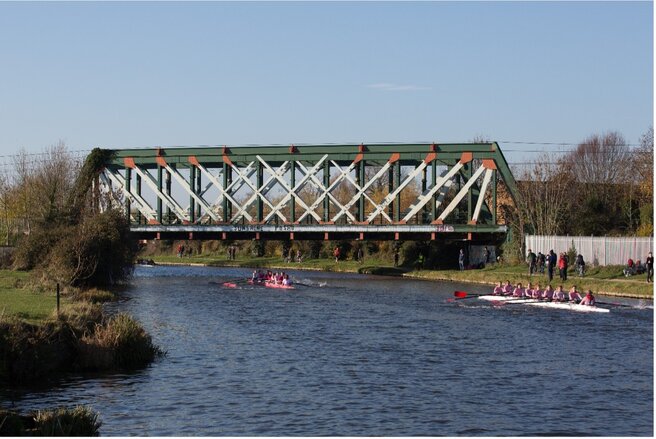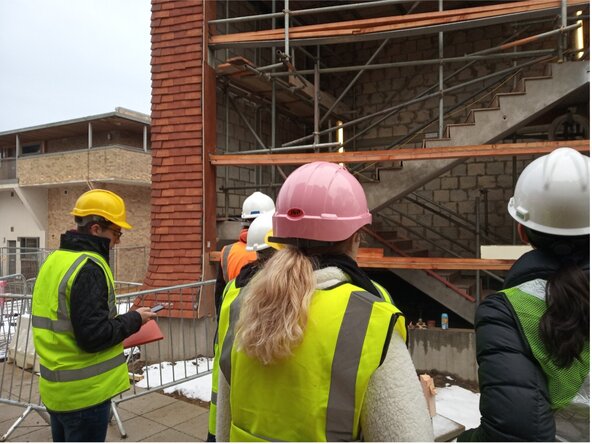Are you curious to know what it is like to study Architecture at Cambridge?
Third-year Architecture student Mila Giovacchini shares with us what life is like studying at Cambridge.
My name is Mila, I’m French and I study architecture at the University of Cambridge. I’m finishing my third year here and will graduate with a BA in Architecture.
Why Architecture?
Architecture is an immensely varied course that introduces you to so many topics and gives you many skills.
Many students, myself included, choose to study Architecture because they feel like they can’t choose between the arts and sciences, but I would argue that Architecture is neither!
The biggest thing you learn to do in an undergraduate degree in Architecture is how to design space. While both my A-Level Physics and my drawing skills did come in useful, designing and thinking about Architecture is an entirely different way of working.
Why Architecture At Cambridge?
It is true that Cambridge can be a very stressful and overwhelming place. Many students here experience imposter syndrome and it’s common to feel burnt out at the end of every term.
The terms here are only 8 weeks long and very intense. You’ll get a lot of content from lectures and supervisions, and you submit a portfolio of your studio work at the end of each term.
The most difficult thing about architecture, especially in the first year, is not comparing yourself to your peers. Each student has their strengths and it’s easy to overlook your skills and talents when you see so much beautiful work around you.
This being said, the department here is incredibly friendly. Especially compared to other subjects here, architecture is super diverse and has students coming from very different backgrounds.
While the numbers of students admitted per year is growing, the course is still quite small compared to other universities, so you can get to know the people in your year really well. Working all together in studio creates a great atmosphere and can be a really fun place to work and socialise at the same time.
We often ask each other for help or advice on our work, and first years especially will learn a lot from other years, be that learning new commands for software, or asking for opinions on their designs.
Early preparation is the key to a successful Cambridge Architecture application.
Writing the perfect Personal Statement, and interviewing like a pro is how you get your dream Cambridge Architecture offer.
Discover our Engineering Programme for comprehensive admissions support by clicking the button below to enrol and triple your chances of success.
Studying at Cambridge
Because architecture is so wide, it’s important to pick a university whose course appeals to you, because each school will teach it slightly differently. While all the bases will be covered and we all get the same degree, some schools focus more on certain aspects
The undergraduate degree here is 60% studio, where you work on a design project within a studio taught by practising architects, and 40% lecture courses including history and theory, construction, structures, and environment that are assessed on coursework and presentations.
Cambridge is known for providing very good opportunities to expand your theoretical and philosophical knowledge of space and architecture. In our third year, we have to write a dissertation that counts for 20% of our grade.
This can be on any topic, from urbanism, to architecture in film, to the politics of space, or the environmental implications of materials, the list goes on. You get to work with professors that are experts in their field.
Cambridge Life
What sets Cambridge aside is also its college system. I have found being in a college helped me make friends, as it forms a smaller subset of students within the university.
College is basically your home, and while there might be one or two other architecture students in your year from the same college, many of us end up having both “architecture friends” and “college friends”.
There are also a host of college-specific societies to get involved in, from most sports to art societies and the JCR (the student body that represents undergraduates of that college).
The architecture department has its own society: ARCOSOC, that organises events to raise money for our end of year exhibition, as well as life-drawing events, talks, and much more.
These are all great ways to make friends and take a break from your work. I highly encourage getting involved in student societies, whichever spikes your interest!

While I was here, I picked up rowing, a quintessential Cambridge sport, and it’s become a huge part of my life at uni. It helps me find balance with my work and structure my days.
On days where I have rowing in the morning, I’ll get up at around 6am, have a quick breakfast and cycle to the boathouse. Rowing is done in time for me to cycle to the department for 9 am.
We usually have a couple lectures in the morning 3 days a week, and I’ll sit down with a coffee and take notes on my computer.
A Typical Week Studying Architecture at Cambridge
Twice a week, it is a studio day. We are given briefs on what to design and sometimes assigned sites or areas to work in, but it remains pretty free for us to design and explore what we are interested in.
Some projects will last for a term, and some run through the entire year. We meet individually or in small groups with studio tutors for 30 minutes to an hour to discuss how our projects are going.
Some days or before individual tutorials we have workshops or mini-lectures that can be on software skills or creative workshops, or photography.

Towards the start of term, we usually go on a site visit to the place our projects are located, this can be in Cambridge or further away. I have designed projects in Felixstowe and London for example.
For some of our lectures, we also go on site visits to buildings under construction throughout the year, and studio tutors will also sometimes organise visits to interesting buildings in the area for us to discuss.
Take a look through our collection of Day In The Life articles for more insight into university life:
My Usual Routine
I like to stay in the studio to work. I’ll eat a packed lunch in the garden of the department or go to the corner shop across the street for a sandwich.
Late afternoons in studio often get less productive and chattier, but it’s a lovely vibe, someone puts a playlist on the speakers and we sit within studios and all work together.
Once or twice a week in the afternoon I’ll have a supervision for one of the lecture courses. A small group meets with a teacher, often a PhD student and go over lecture material and discuss essays we’ve written.
During our third year we also meet with our dissertation supervisors around every two weeks to discuss our progress.
Depending on how I’m feeling and if I have any rowing training on that evening, I will cycle back to my college in time to cook myself dinner at around 7 PM.
The studio building can be kept open until 10 PM by students, and as the end of term approaches more of us will stay in later. Working in the studio helps have some work/life balance and leave work behind as soon as you leave the building.
On very studious days, or if I have a deadline approaching, I’ll continue working for an hour or two in college, either in my room or in the college bar or library. I try to do something different like dissertation work or reading and essays for lecture courses.
Most days though I’ll spend some time with friends, go to the gym or take my time to get ready for bed, prepare lunch for the next day, call my mum.
While routine is helpful, what makes university great is how flexible you are with your time. Many days will have something impromptu, like a trip to the ice rink to skate, a visit to the Cambridge market and shops or a pub trip in the evening.
I’m usually in bed around 11 PM every day, or earlier if I have rowing the next morning.
Top Tips
Finally, here’s some quick fire advice for studying architecture at Cambridge:
- Staying on top of sleep is the most important thing you can do to make your life easier at uni.
- Always allocate twice the amount of time you think it will take you to do a piece of studio work (design, drawing, model making..).
- Comparison is you worst enemy, focus on what you know how to do, not what you do not.
Conclusion
To conclude, I will forever cherish my time at Cambridge. I have met so many amazing and interesting people, discovered my passion for sports, and have really grown as a person from the opportunities and challenges this course and university offers.
I will add that while I am still not sure if being an architect is for me, this degree has taught me so much about a variety of topics, in the social sciences, on urbanism and cities today, on structural and materials challenges… and opened my eyes to what it means to design and think about space.
I am now looking to work for a year in an architectural firm in order to see what the working world is like in the field. Whether I end up being an architect or not, I do not regret this degree at all.
Applying to Cambridge is incredibly competitive, but we’ll ensure you can compete with fellow applicants.
Applying to Cambridge is immensely competitive, and you must give yourself the best chance of success. We help you craft the perfect Personal Statement and teach you how to Interview effectively – covering all areas of your Cambridge application.
Discover our Cambridge Architecture Premium Programme for comprehensive admissions support by clicking the button below to enrol and triple your chances of success.








